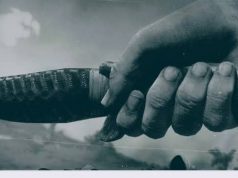
The decision to bring back Post-UTME tests was reached at the policy meeting on plans and modalities for the conduct of admissions into tertiary institutions on August 22, 2017 at the National Judicial Institute, Abuja.
DEJA vu! We’ve been here before, over and over again. Each time, disapproval is impossible to rein in. What should have been routine policy measures keep triggering off potshots. You know the story: JAMB reintroduces Post-UTME (many candidates’ blood pressure rise at that), and cut-off mark for admission consideration is 120 minimum (so gracious what!) That sets Nigerians off on complaining mode again.
They say it is “politics”, a way of squeezing money out of helpless admission-seekers, a ploy to increase advantage of a part of the country that lacks what it takes to compete in fair academic contest for tertiary school slots. And the hoopla goes on, not without justification, anyway. What none of the opponents is openly telling us: “hmm, my country-man, the way this country is eh, I don’t trust you, you don’t trust me, so any plan you come up with, I fear, must have been made to enrich or favour you and your people, putting me and my people at a disadvantage.” Calamity of a nation! Hence, JAMB is confused. Not because of incompetence, but the admission umpire is bombarded with demands from all sorts of interest groups in high and low places, some too powerful for them to resist.
The decision to bring back Post-UTME tests was reached at the policy meeting on plans and modalities for the conduct of admissions into tertiary institutions on August 22, 2017 at the National Judicial Institute, Abuja. To come off with clean hands, escaping the usual accusation of bias, JAMB had allowed tertiary school heads and other non-government stakeholders at the conference to decide what UTME score should be minimum requirement. The Joint Admissions and Matriculation Board maintains that institutions’ senates retain the prerogative to decide their own admission scores which may be higher than this nationally-fixed minimum.
The admission body also addressed concerns of candidates and private universities by creating CAPS – Central Admissions Processing System – which would make it possible for applicants rejected by their choice institutions to seek admission elsewhere. CAPS also provides a platform for schools to go in search of qualified candidates who in turn are free to reject the offer and have unlimited admission options, provided they have scored the minimum 120 in Unified Tertiary Matriculation Examination.
Agreements reached at that meeting should not have raised much dust if Nigerians had trusted one another. Institutions that think they are too big to take a mere 30 per cent cut-off mark are free to set a higher requirement. Admission options can be effectively graded: high scorers get admitted in higher-standard institutions, while those with low scores find placement in less prominent schools. That’s if the claim that higher UTME score equals high academic competence holds true. Moreover, the extra admission options through CAPS should lay to rest the problem of candidates who get jammed in JAMB every year, simply because they could not find a place in their schools of first, second or third choice. But no, Nigerians must kick – they always kick – even if the kick results in stillbirth. National Association of Nigerian Students (NANS) disparages the decision. NANS President, Chinonso Obasi said JAMB was lowering standards by settling for a score that is just 30 per cent of the total 400.
He claimed it is an unpopular policy that students will vehemently resist. But how does this new move impinge on the right of admission-seekers who score higher? And how does it lower the ability of universities to recruit only the best? After all, that score is not the maximum they can take. NANS is only one of the opponents, and each pressure group is shouting either merely to be heard or just protecting its own part in the deal, all the while being suspicious of others, since distrust is the norm here. Those in favour of the policy may accuse this student body of disregarding private schools’ interest since most officials and active members of NANS at state and national levels are from government-owned institutions. Other interest groups have their misgivings.
In truth, JAMB is not the problem. Distrust is the matter, while nepotism and perversion of standards fuel this state in which nothing is ever accepted as good for all. It’s no use arguing about effects rather than causes. We will not get out of this quagmire anytime soon, for it takes a long time to reset minds of people so they can believe that government and leaders of public institutions ever have good intentions. Don’t forget that leaders in more ways than one take dubious actions that erode public confidence. You cannot win citizens’ trust when, as a leader, you serve the interest of one group over another. As a consequence, people’s minds get made up to resist every decision you make. You cannot change the people’s minds, except there are changed hearts. Positively changed hearts give birth to altruistic actions and selfless leadership. As people with changed hearts act unselfishly and the thing catches on, virtue becomes the norm, then society produces leaders that can be trusted. Until then, we must live with this burden – the burden of distrust.
When people believe that their tribe and religion is the only good one, their minds are set to ensure that only their own group gets the best of everything. When such people are in charge of any public office, every decision is in favour of where they belong. But don’t tell me that religion is the problem of Nigeria. True religion teaches fairness to all. In James 1:27, the Bible says that “Pure religion and undefiled before God and the father is this, to visit the fatherless and widows in their affliction, and to keep himself unspotted from the world.” If a man holding public office withholds help from the needy and reserves it for those of his tribe and religion, he offends God. But that is what most of our leaders do, aided of course by ungodly followers, and that is why the rest of the people cannot trust them. A change of heart, not changes of policy is what citizens and leaders need.
Reduction in cut-off marks will bring down the quality of higher institution products, opponents say. Really? How will people who passed who passed their O’ level exams through a culture of irregularities suddenly become shining examples of academic excellence just because they scored high in UTME – by hook or crook. And do not tell me that the examination has been made malpractice-proof. Candidates – being true Nigerians – found ways to and actually beat computers to the game of cheating in their CBTs. The problems are deep, and a deep look into the hearts of people is required. We need a deeper conviction that comes from something bigger than the mundane.
Should one pontificate on honesty and patriotism and selflessness? You have heard of these values before, but how many Nigerians really believe in them (and why should they, when easy money, quick gain and parochial loyalty are better recognised, even more rewarded)? The change of heart we are talking about is brought about only by God, and a man wholly committed to God will overlook sectional approval to do what is just and fair. God sent Jesus his Son to die for the world, setting them free from sin and works of the flesh. Nepotism is a work of the flesh; corruption is a work of the flesh; ethnic bias is a work of the flesh. Those who believe in Jesus and surrender to him receive freedom from the flesh, thus becoming good citizens who respect the law, who love others (irrespective of religion) and who regard service in government as an opportunity to be a blessing to other people, wherever they come from.
Therefore, God’s hand is the best one to relieve policy-makers and the rest of us from this burden of distrust. I challenge anyone to put forth a better option.
Esara wrote from Ritman University, Ikot Ekpene, Akwa Ibom State.





Anyone else having issues viewing this on mobile device?